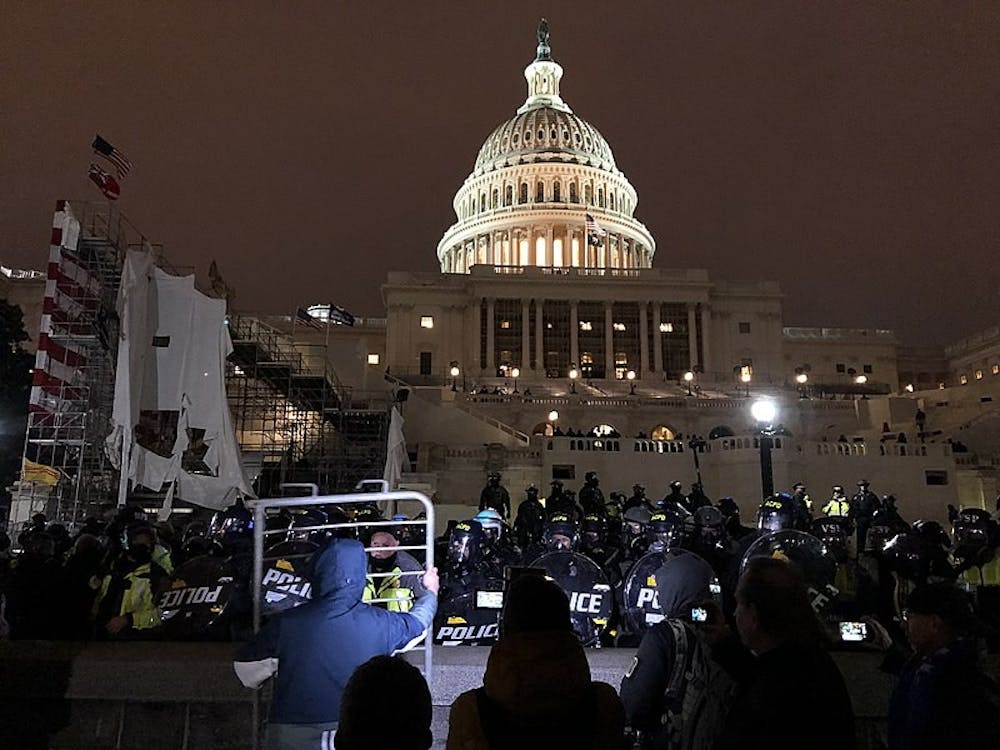The Department of Homeland Security released a threat assessment report in which they wrote “racially and ethnically motivated violent extremists — specifically white supremacist extremists — will remain the most persistent and lethal threat in the Homeland.” The greatest terrorist threat to the United States is no longer ISIL or Al-Qaeda — it is homegrown terror. On Jan. 6, we saw right-wing extremists do what foreign terror groups have never been able to accomplish — disrupt Congress’s constitutional duties. The insurrection at the Capitol only cemented what has been a longstanding fact — we have ignored domestic terrorism for far too long.
Since 1994, right-wing terrorists have accounted for the majority of terrorist incidents in the United States. Over the last few years, however, things have gotten much worse, as right-wing extremists were emboldened by former President Donald Trump’s radical rhetoric. In 2017, this was shown in the form of the Unite the Right Rally, where white-supremacists and neo-Nazis violently protested and killed Heather Heyer. It’s also apparent with Robert Bowers, who killed 11 Jewish people at the Tree of Life Massacre in 2018. In 2019, there was yet another right-wing terrorist attack, this time in El Paso, where a gunman killed 23 people. Despite posing a major risk to Americans, law enforcement agencies have failed to properly address rising right-wing extremism and instead have focused on peaceful, anti-police activists.
Groups protesting against police violence have received disparate treatment from law enforcement when compared to right-wing insurgents. During the summer protests after the murder of George Floyd, law enforcement agencies used every tool at their disposal to quell almost entirely peaceful protests. The Drug Enforcement Agency, usually tasked with large-scale narcotics trafficking, was ordered to conduct “covert surveillance” of protesters and Black Lives Matter leaders. On June 1, 2020 — the day former President Donald Trump ordered law enforcement to violently clear Lafayette Square — there were roughly 6,000 law-enforcement officers in Washington. That same day, police arrested 326 protesters. Comparatively, only 61 right-wing insurgents were arrested Jan. 6, despite the FBI’s warnings in the days before that they were seeking a “war.” As fellow Cavalier Daily columnist Aliyah White wrote, “Rubber bullets and teargas are reserved for BLM.”
Part of the reason that left-wing groups and Black protesters are treated more harshly than right-wing radicals is because law enforcement personnel often identify with right-wing terrorists. In fact, an FBI policy directive from 2015 indicated that “militia extremists, white supremacist extremists, and sovereign citizen extremists often have identified active links to law enforcement officers.” It follows the same thread of a similar 2006 assessment from the FBI, which claimed right-wing extremists have successfully infiltrated law enforcement.
Extremism, however, hasn’t just infiltrated the organizations tasked with protecting us — they are also present in the bodies that craft our laws. Multiple Republican members of Congress have encouraged and supported right-wing extremists. Rep. Marjorie Taylor Greene, R-Ga. — a racist conspiracy theorist — is allegedly tied to multiple hate groups and militias. She also spread conspiracy theories that the Pentagon was never hit during the Sept. 11 attacks, that the Parkland shooting was staged and has signified her support for QAnon — conspiracy theories that remain popular among right-wing extremists. Another, Rep. Lauren Boebert, R-Colo., is also tied to various militia groups and insists on carrying a gun in Congress. The Republican Party of Florida and Rep. Matt Gaetz, R-Fla., have used the Proud Boys — one of the main extremist groups involved in the insurrection — as security. Charlottesville’s representative, Bob Good, spoke at an event hosted by a militia. Good’s District Director was also present at the rally Jan. 6 and marched to the Capitol. With extremism alive and well in the halls of Congress and in law enforcement, we need to get more serious about countering domestic radicalism.
Generally, law enforcement personnel have been wary about interceding in online right-wing communities because of First Amendment concerns. Another problem is that terrorism isn’t a specific criminal offense in federal law. Even so, there are still steps we can take to stop right-wing extremism. An easy step is to force social media companies and online platforms to deplatform notable right-wing extremists. Some have already taken these steps, like when Twitter and other tech companies removed Trump’s accounts on their platforms. Groups such as the Anti-Defamation League and Southern Poverty Law Center have encouraged such measures, while others, including DeplatformHate, are set on actively tracking down and exposing anonymous extremists and removing their platforms. While deplatforming can reduce the reach and audience of various extremist groups, it won’t finish the job. We need comprehensive legislation that refocuses our extensive law enforcement capabilities on the real threat — domestic terrorism.
Serious solutions to domestic terrorism and radicalization need to come from the realization that extremism is entering the mainstream on the right. Republicans condemned elected officials who supported impeaching Trump, but applauded Marjorie Taylor Greene after she was exposed for spreading conspiracy theories and harassing school shooting survivors. Instead of legitimizing extremism, Republicans need to stop giving platforms to lunatics and start fighting domestic terrorism.
Jeremy Siegel is an Opinion Columnist for The Cavalier Daily. He can be reached at opinion@cavalierdaily.com.
The opinions expressed in this column are not necessarily those of The Cavalier Daily. Columns represent the views of the authors alone.







